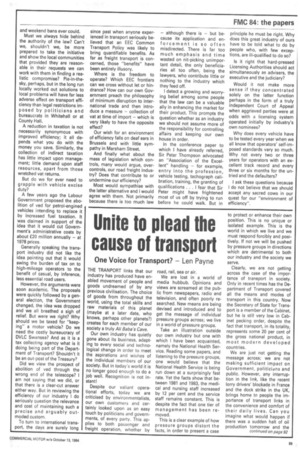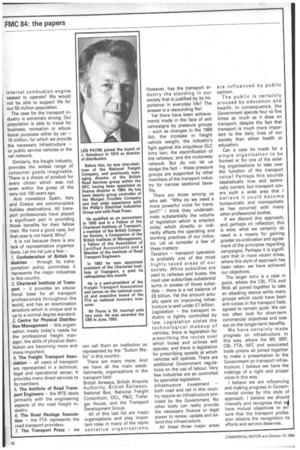Unite to plead the cause of transport
Page 91

Page 94

If you've noticed an error in this article please click here to report it so we can fix it.
One Voice for Transport? — Len Payne
THE TRANPORT links that our industry has produced have enabled movement of people and goods undreamed of by any previous civilisation. The choice of goods from throughout the world, using the total skills and raw materials of this planet (maybe at a later date, who knows, perhaps other planets?) creates for each member of our society a truly All Baba's Cave.
Our own industry has quietly gone about its business, adapting to every social and technological change in order to meet the aspirations and wishes of the individual members of our society. But in today's world it is no longer good enough to do a job well. Recognition is not instant!
Despite our valiant operational efforts, today we are criticised by environmentalists, our own customers and certainly looked upon as an easy touch by politicians and governments, of every party. This applies to both passenger and freight operation, whether by road, rail, sea or air.
We are lost in a world of media hubbub. Opinions and views are screamed at the public from newspapers, radio and television, and often poorly researched. New means are being devised and introduced and to get the message of individual pressure groups across; we live in a world of pressure groups.
Take an illustration outside our own industry but one with which I have been acquainted, namely the National Health Service. Reading some papers, and listening to the pressure groups, one would believe that the National Health Service is being run down at a surprisingly fast rate. Yet the facts show that between 1981 and 1983, the medical and nursing staff increased by 12 per cent and the service staff remains constant. This is despite the fact that one tier of management has been removed.
This is a clear example of how pressure groups distort the facts, in order to present a case to protect or enhance their own position. This is no unique or isolated example. This is the world in which we live and we must respond forcibly and positively. If not we will be pushed by pressure groups in directions which are detrimental to both our industry and the society we serve.
Clearly, we are not getting across the case of the importance of transport in society. Only in recent times has the Department of Transport covered all the means and modes of transport in this country. Now the Secretary of State for Transport is a member of the Cabinet, but he is still very low in Cabinet pecking order, despite the fact that transport, in its totality, represents some 20 per cent of the gross national product, in most modern developed countries.
We are just not getting the message across; we are not making sufficient impact on Government, politicidns and public. However, any interruption in the link, like the recent lorry drivers' blockade in France and the dock strike in the UK, brings home to people the importance of transport links in the convenience and comfort of their daily lives. Can you imagine what would happen if there was a sudden halt of oil production tomorrow and the internal combustion engine ceased to operate? We would not be able to support life for our 55 million population.
The case for the transport industry is extremely strong. Our population is able to travel for business, recreation or educational purposes either by car — 15 million, for which we provide the necessary infrastructure — or public service vehicles or the rail network.
Similarly, the freight industry, provides the widest range of consumer goods imaginable. There is a choice of product for every citizen which was not even within the grasp of the very rich 100 years ago.
And nowadays Spain, Italy and Greece are commonplace holiday destinations. All transport professionals have played a significant part in providing those benefits for their fellow man. We have a good case, but that case is not heard. Why?
It is not because there is any lack of representative organisations. Let me list just a few: 1, Confederation of British Industries — through its transportation policy committee it represents the major industries in this country.
2, Chartered Institute of Transport — it provides an educational base for all transport professionals throughout the world, and has an examination structure which is unique and is up to a normal degree standard.
3, Centre for Physical Distribution Management — this organisation meets today's needs for the professional freight manager; the skills of physical distribution are becoming more and more important.
4, The Freight Transport Association — all users of transport are represented in a technical, legal and operational sense; it provides many direct services to its members.
5, The Institute of Road Transport Engineers — the IRTE deals primarily with the engineering aspects of the road freight industry, 6, The Road Haulage Association — the FTA represents the road transport providers.
7, The Transport Press — we can call them an institution as represented by the "Sutton Mafia" in this country.
There are many more. And we have all the main establishments, organisations in the transport field: British Airways, British Airports Authority, British Railways, National Bus, National Freight Consortium, OCL, P&O, Trafalgar House, and the Transport Development Group.
All of this last list are major organisations and play important roles in many of the representative organisations. However, has the transport industry the standing in our society that is justified by its importance in everyday life? The answer is a resounding No!
Yet there have been achievements made in the face of anti campaigns by pressure groups — such as changes in the 1968 Act; the increase in freight vehicle weight; the industry's fight against the iniquitous GLC lorry ban; the electrification of the railways; and the motorway network. But do not let us dodge the fact — these pressure groups are supported by other members of the transport industry for narrow sectional benefits.
There are those among us who ask: "Why do we need a more powerful voice for transport?" I think they underestimate substantially the volume of legislation which is enacted today which directly or indirectly affects the operating and working practices of our industry. Let us consider a few of these matters: Taxation — transport operation is probably one of the most highly taxed areas of our society. While subsidies are paid to railways and buses, the road user subscribes substantial sums in excess of those subsidies — there is a net balance of £8 billion. Yet the amount actually spent on improving infrastructure is well under £1 billion. Legislation — the transport industry is tightly controlled by law. Legislation states the technological makeup of vehicles; there is legislation for prescribing the routes over which buses and airlines will operate; and there is legislation for prescribing speeds at which vehicles will operate. There are additional Government regulations on the use of labour. Very few industries are so controlled by specialist legislation.
Infrastructure investment — both road and rail in this country require an infrastructure provided by the Government. No other body can really provide the necessary finance or legal power to renew, update and extend this infrastructure.
All these three major areas are influenced by public opinion.
The public is certainly aroused by education and health. In consequence, the Government spends four to five times as much as it does on transport, despite the fact that transport is much more important to the daily lives of our society than either health or education.
Can a case be made for a single organisation to be formed or for one of the existing organisations to take over the function of the transport voice? Perhaps this sounds idealistically true and technically correct, but transport covers such a wide area that I believe it could become bureaucratic and monopolistic as has occurred with many other professional bodies.
If we discard this approach, and perhaps on reflection, this is wise, what we certainly do need is a means for gaining greater co-ordination and agreement of the principles regarding campaigns. Perhaps it is significant that in more recent times, where this style of approach has been taken, we have achieved our objectives.
The larger lorry is a case in point, where the CBI, FTA and RHA all joined together to take an attacking stance while many groups which could have been anti-voices in the transport field, agreed to remain quiet. We can too often look for short-term commercial objectives and lose out on the longer-term benefits.
We have certainly made progress on infrastructure in this way, where the BR, BRF, CBI, FTA, NFC and associated trade unions all joined together to make a presentation to the Government on transport infrastructure. I believe we have the makings of a right and proper voice in this way.
I believe we are influencing and making progress in Governmental circles by this style of approach. I believe we should intensify and recognise that have mutual objectives to ensure that the transport profession obtains the recognition its efforts and service deserves.
















































































































































